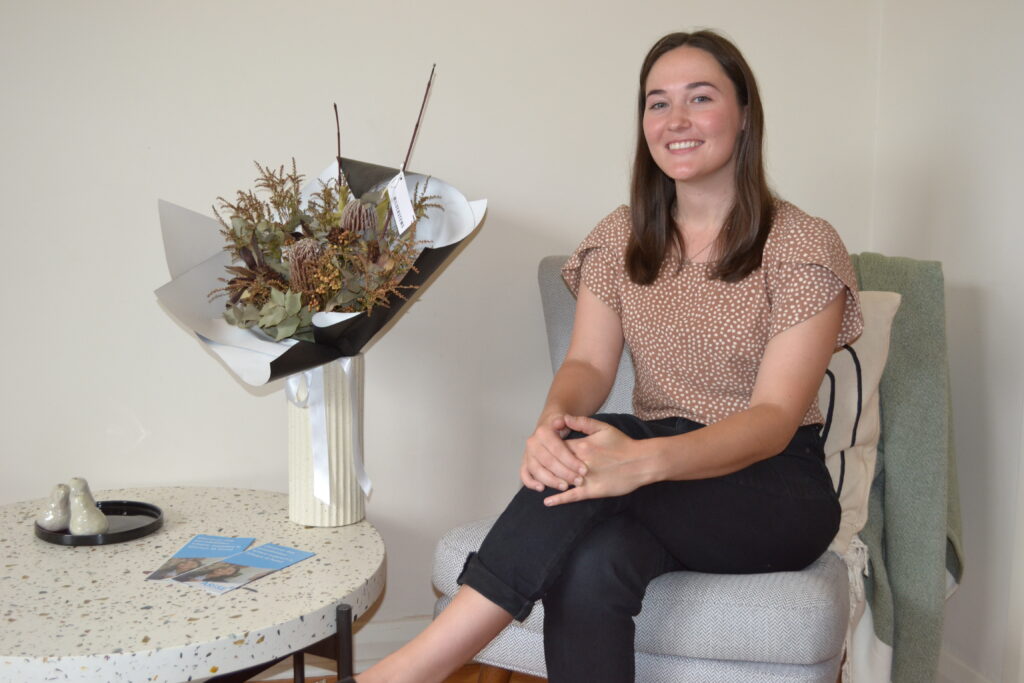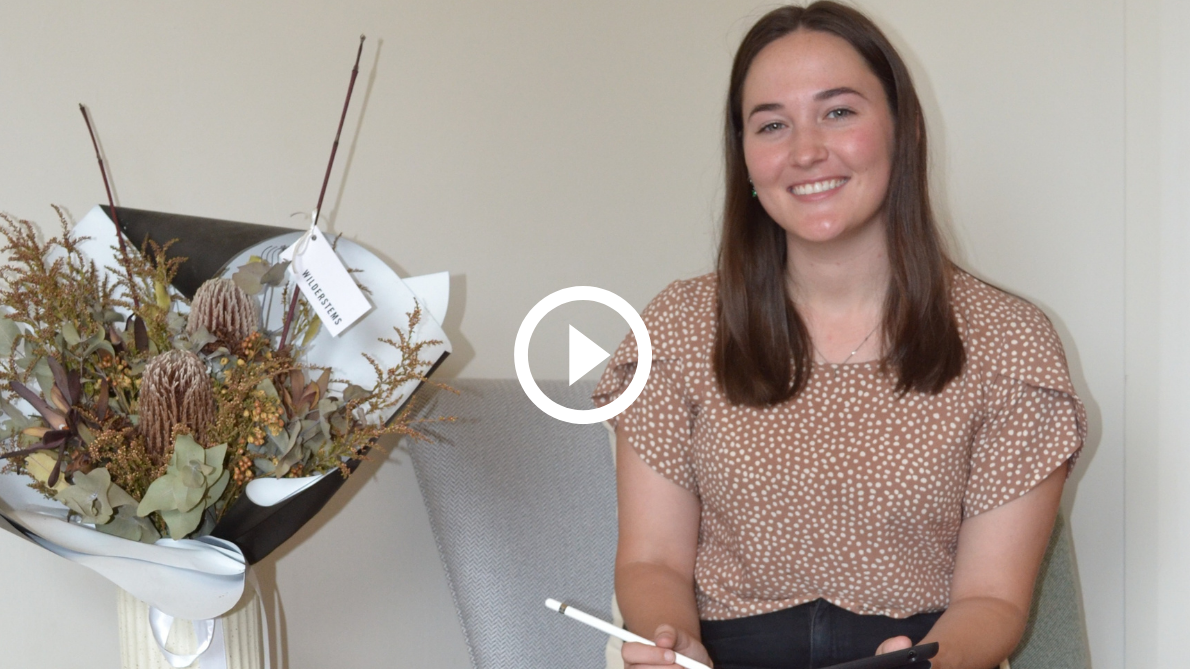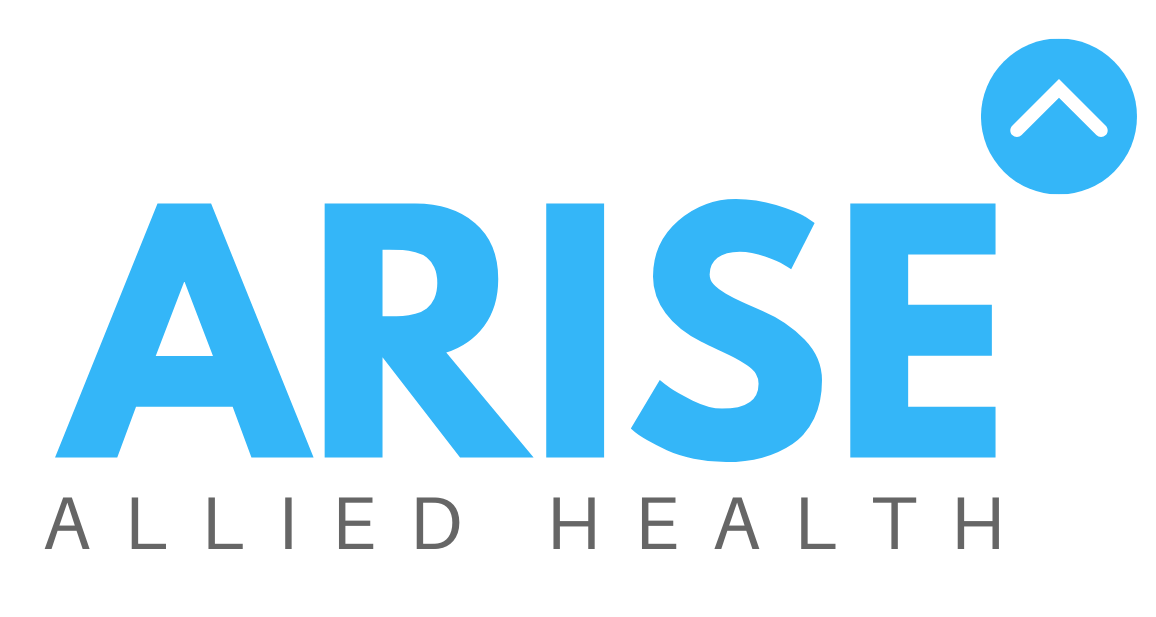
We sat down with Tahlia, one of our provisional psychologists and positive behaviour support practitioners, to get her perspective on the company, what we offer our clients, and her experience with us so far.
For full access to the video interview, click here.
What was your reason for getting into psychology?
I originally started a physiotherapy degree at university, which I didn’t really love. Then one day, we had a lecture on the brain and behaviour, and I knew then that psychology was for me, and I wanted to work with people in that capacity.
Can you tell us about Arise Allied Health?
Arise Allied Health is a small family-run and owned practice. The clinicians there provide individualised, holistic, evidence-based support and interventions for clients and their supports.
What do you enjoy about the Arise Allied Health company culture?
The company culture at Arise Allied Health is great; although we are a small team, it really means we can be close and supportive of one another. So, for example, one day, I might pop my head into someone else’s office to ask a question or bounce an idea off; so, we are supported in this way. However, we also have supervision and training, which is more formal support. We also can work from home if we need to, so overall, we have an encouraging and flexible working environment.
What would a day at Arise Allied Health look like for you?
My days are very different; one day, I might go into the office to see clients or be out in the community seeing them in their homes or at the school. On other days, I might be doing an assessment or meeting with a client and all their stakeholders and supports. Another day I could be doing training or supervision – It really does depend.
What is the most rewarding aspect of your job?
The most rewarding aspect of my job is when I might notice a positive change in a client. Some clients will tell you directly that they feel better, whereas others might be a little more subtle. We use data and take notes at work to point out to the client and say, “Hey, you are doing a lot better since we first met; why do you think that is?” Usually, they respond by saying, “I am feeling better.” It is so good when the client notices that and can pin it to the work you have been doing with them.
What is your initial process once a client has been allocated to you?
My initial process starts with reading the information that we have on file from them; this could be their NDIS plan or a previous doctor’s report. Then, I try and gain as much information as possible so that when I meet them, I am well prepared and have a solid foundation that understands what they have been going through.
Once a client is allocated to you, what is your communication process with the support coordinator and or client representative?
Once a client has been allocated to me, and I have read the information on them, I will usually contact the person who has made the referral. Often, this is their support coordinator, guardian, or parent, if it is a child. I will contact them and say, “Hey, I am ready to engage with the client. Can we make an initial appointment where I can begin to get to know them?”.
What benefits have you seen from working with NDIS participants who have used psychology or positive behaviour support services?
There are so many benefits; it would be so hard to list them all; however, some may range from developing positive coping skills, communication strategies, regulating their emotions better, or interacting with the people around them in a more positive safer way.
Provide a client example that reminded you of why you got into psychology in the first place.
I have a client I have been working with for some time now and have had quite a few sessions together. He came to us because he was dealing with some pretty severe anxiety and depressive symptoms. Over the course of intervention and treatment, we both noticed that he was saying that he was feeling a lot better, having far fewer negative and intrusive thoughts. So I said to him, “what do you think it has been in the life that has made you feel better and more positive?” He responded, “honestly, just having you around to talk to and listen to me and validate my emotions has been so beneficial. He really needed that person to talk to, and I think having that support is helpful.
What do you find helps a client engage and open up?
I find that building a solid rapport helps the client open up, so I usually spend the first session really getting to know them before we dive into anything like treatment or intervention. I also like to let the client get to know me to make sure that we are a good fit. Although sometimes it might take a couple of sessions to develop rapport, especially if they are children, I will play games to help them open up. I aim to get to know the client a bit more before talking about why they have been referred to me.
How do you think providing a mobile service assists the client?
Providing a mobile service helps clients in so many ways; although our office is wheelchair accessible, we go out to see many of our clients. So often, it is difficult for clients who do have mobility issues because they need to spend a lot of their time getting to the office and then back home. So if we can see them in their homes, we can provide a service in an environment that they are more comfortable and familiar with. It also doesn’t take up a lot of their day or the time for their support workers who need to bring them into the office, which means they can have that time and freedom for themselves.
What type of locations have you attended to accommodate the client?
Although our office is in Morphett vale, we visit clients that are anywhere within the Adelaide Metropolitan area. I visit several locations to accommodate many of my clients, from the north in Gawler or down south to Aldinga; we have clients in Victor Harbour and Murray Bridge. We can travel to a variety of locations.
What is the client age bracket that you work with?
I work with clients of various ages, with my youngest client currently aged five and my oldest client in his mid 70’s.
What is your process when working with clients from non-English speaking backgrounds?
When we have clients from non-English speaking backgrounds, our admin staff will see this on the client profile, contact the translating service, and ask for a translator to attend each appointment with us.
Would you like to share one piece of wisdom that has stuck with you?
Be authentic and compassionate because clients can see when you are not yourself. Also, remember that when working with NDIS participants, allowing them to open up and be vulnerable to share their thoughts and feelings with you is a privilege.



Wow … good start Arise
good to know about your practices and Virtually meet you guys.
keep the good work